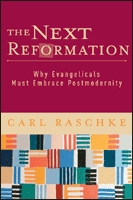Why Evangelicals Must Embrace Postmodernity

The Next Reformation: Why Evangelicals Must Embrace Postmodernity and other upcoming books
Sooner or later it was bound to happen: a thoughtful professional philosopher with Christian faith would engage the emerging/postmodern church conversation. The right person for the job, Carl Raschke, has risen to the occasion. Intelligently written for those already knowledgeable and accessible to those needing an introduction, The Next Reformation will become a primary trailhead for thoughtful people who are embarking on the faith journey into postmodernity."
Brian McLaren
Postmodernism has become a four-letter word among many evangelicals. It has been blamed for every malaise of contemporary society and vilified as the greatest threat to contemporary Christian faith. In The Next Reformation, Carl Raschke acquaints readers with what postmodernism really is, and more importantly, what it is not. He argues that evangelical Christianity has allied itself with non-Christian philosophies, including rationalism and evidentialism, and suggests that breaking this alliance and embracing postmodernism may allow evangelical Christianity to flourish once again as a progressive rather than reactionary force in the present-day world.
Raschke begins with a detailed analysis of the current state of postmodernism and evangelical thought. He provides a background to the controversy, revealing what the term has meant in different contexts and how it relates to contemporary evangelicalism. He describes the development of postmodernism, explores the writings of early postmodernist thinkers, and examines how postmodernist thought has influenced contemporary theology from Derridian deconstruction to Radical Orthodoxy.
Raschke then reveals the opportunities postmodernism brings to Christian faith. He examines how postmodern perspectives bring new meaning to the doctrines of faith alone and sola scriptura, illustrating how these doctrines can be revived by means of postmodern language and philosophy. Raschke goes on to explore how postmodern views of hierarchy and organization could alter the structure of the church toward the Reformation theme of the priesthood of all believers.
The Next Reformation finishes with an analysis of postmodern culture and ministry. Raschke examines postmodern strategies of outreach and evangelism as well as the impact of charismatic renewal on postmodern evangelism. He concludes with a plea for the beginning of a new appreciation of the relationship between faith and philosophy.
Baker Academic
This new book by Carl Raschke, who serves as professor and chair of the Department of Religious Studies at the University of Denver as well as an adjunct faculty member at Mars Hill Graduate School in Seattle, seems to be a must read! I understand it's slated to be released next month.
Similarly, I learned that James K A Smith, who wrote the about to be released Introducing Radical Orthodoxy and is currently the Associate Professor in the Philosophy Department of Calvin College, is also working on another book on postmodernism and the church that he's calling Who's Afraid of Postmodernism? A Radical Orthodoxy for the Emerging Church. About the book he writes:
Growing out of my 2003 lectures at L'abri Fellowship in Switzerland, my goal in this book is to critically engage and explain the culture of postmodernity, particularly with a view to the implications of postmodernity for the life of the Church. In the process I'll critically engage the work of figures such as Brian McLaren and Leonard Sweet, offering a 'friendly critique' of their picture of the postmodern church. This will be the first book in a new series I am editing for Baker Academic Press: Critical Theory for the Postmodern Church. Other authors in the series will include John D. Caputo, Merold Westphal, and others. Stay tuned for details. 
Monday, October 11, 2004
Subscribe to:
Post Comments (Atom)






No comments:
Post a Comment